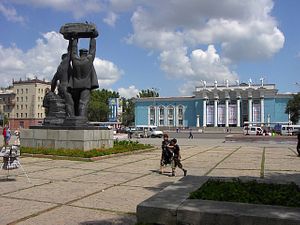Hundreds of miners in central Kazakhstan have gone on strike against worsening work conditions and overdue back salaries, sparking cries of solidarity from across the country, including opposition members and human rights activists.
The miners chose a typical and powerful form of protest, recently employed by Chilean miners, as they refused to return to the surface after their shift ended, obstructing the regular flow of labor and production at the mines. Simultaneous action took place in four mines owned by ArcelorMittal Temirtau (AMT), a subsidiary of Luxembourg-registered steel giant ArcelorMittal, all located in the central Karaganda region. In the following days, the strike expanded to all eight mines controlled by AMT.
According to Labor Minister Tamara Duisenova, 684 miners participated in the first two nights of the strike on December 11-12. The Karaganda region’s press service said that the intervention of Yerlan Koshanov, the region’s governor since March, persuaded 154 of them to climb back to the surface on December 13. Activists on social media, however, denied the claim. According to ongoing reports, striking miners were offered an immediate 30 percent raise in salary, after submitting an original request for a two-fold increase, better conditions and a more favorable track to retirement. The worker representatives split from the Korgau union that had negotiated the deal and refused the company’s offer.
Wives and relatives of the miners approached the sites to provide warm clothing and food. On social media, messages of solidarity arrived from all corners of the world.
A handful of political figures chimed in to mitigate the tensions.
“Emotions shouldn’t play a role here. The company, trade unions, and workers will reach a solution through dialogue,” Nurlan Nigmatullin, chairman of Kazakhstan’s parliament, told the press.
“While we, as deputies, have to minimize the risk of doing business in the country, in this case we have to side with our working citizens and protect their rights and interests,” Nurtai Sabilyanov, a majority member of the parliament, told reporters.
Importantly, however, some of the most important political figures in the countries preferred not to comment. President Nursultan Nazarbayev, who climbed the ranks of the Soviet Communist Party while working in the steel plant in Temirtau, is aware of the situation, according to his daughter Dariga, a senator.
“The president has been briefed on the situation, just like with everything else going on in the country. I’m sure he is watching closely the events in the Karaganda region, one that is very dear to him,” Nazarbayeva said.
In a turn of events, AMT decided to pursue legal means against the striking miners and their unions. The company deemed their strike illegal and filed a lawsuit in a local court on December 14. The decision came hours after Paramjit Kahlon, head of the company, sent a letter to the striking workers asking them to consider halting the strike and join talks with the government and the management. The court rapidly called the strike “threatening for human life” and ordered the workers to climb back to the surface.
The strike at AMT mines came less than two weeks after another industrial action in the nearby mining town of Zhezkazgan, where around 300 workers refused to resurface at a copper mine owned by Kazakhmys, a “sister” company of London-listed KAZ Minerals. The two-day strike resulted in the company bowing to the workers’ requests.
Precarious contract and working conditions over the past few years have contributed to stirring up tensions. In mid-2014, AMT slashed 1,000 jobs from its steel plant in Temirtau. In 2015 the company moved to cut worker salaries by 25 percent, but was stopped by the regulator. After promising a pay increase to match inflation and currency devaluation at the end of 2015, the company canceled a scheduled raise in February 2016. Three miners died in November 2016 at the company’s Saranskaya mine after a monorail accident and three more died in August 2017 due to a methane leak that provoked a mass evacuation from the Kazakhstan mine.
Political analyst Dosym Satpayev tweeted that the authorities had forgotten the “lessons of Zhanaozen,” the 2011 clash between workers and police in an oil town in the west of the country, in which at least 15 workers were killed. As the anniversary of the clash nears, the echoes of Zhanaozen grow stronger in Kazakhstan. The new strike could be another opportunity for the authorities to change their political approach to industrial action and offer more opportunities for dialogue between workers and companies. While the latest Labor Code went in the opposite direction, de facto eliminating independent trade unions, the course could easily be reversed.

































